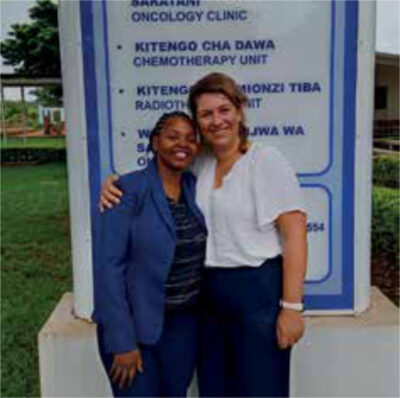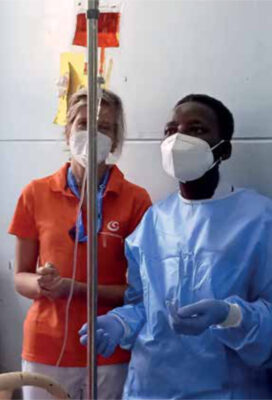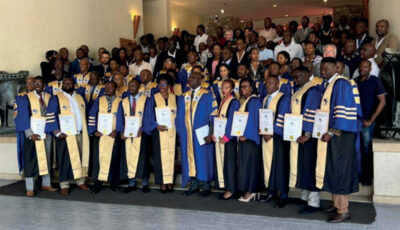Main content
Abstract
Background: Cancer is a disease that affects over 400,000 children worldwide each year. However, around 80% of these children live in countries where healthcare is limited and survival rates are low (<20%). This is in sharp contrast to the 80% survival rates for children with cancer living in high-income countries.
Method: A descriptive report on the need for sustainable, long-lasting North-South collaborations within paediatric oncology, and the Dutch experience of such partnerships via the Outreach Programme of the Princess Máxima Center, a centre for paediatric oncology, in Utrecht.
Conclusion: Dismal outcomes of children with cancer in low- and middle-income countries are unacceptable, also because the majority of children with cancer live there. Twinning programmes between paediatric oncology centres can form a sustainable North-South collaboration to improve outcomes for these children globally.
Background
Cancer is a disease that affects over 400,000 children worldwide each year. At least 80% of these children live in low- and middle-income countries (LMICs) where access to health care and survival chances are limited. In contrast, the survival rate of children with cancer in high-income-countries (HICs) is close to 80%.[1,2] This significant inequality in health outcomes is one of the greatest global health disparities and is unacceptable.
In 2018, the World Health Organization (WHO) launched the Global Initiative for Childhood Cancer (GICC), with the overarching goal of achieving at least 60% survival for all children diagnosed with one of the six curable types of cancer by the year 2030, along with optimal quality of life.[3] Various factors contribute to the dismal outcome of childhood cancer in LMICs, including delays and limited access to diagnosis and specialized treatment as well as social factors like social stigma and disbeliefs.[1,4] For example, essential medicines for childhood cancer treatment are included in the WHO’s Model List of Essential Medicines for Children, and 40% of patients in LMICs lack access to all medicines [5,6]. Also, treatment abandonment can reach up to 50% due to the lack of information provided to caretakers by medical personnel as well as negative beliefs and misconception of childhood cancer and treatment.[7]
| Outreach Programme | |
|---|---|
| MISSION | To improve the care, quality of life and survival of children with cancer in low- and middle-income countries |
| OBJECTIVES |
|
| PILLARS |
|
Childhood cancer care involves specialist paediatric care, which requires trained multidisciplinary medical personnel. These include medical doctors, nurses, pathologists, radiologists, pharmacists and laboratory scientists, as well as social workers, child life specialists and other specialists. Over the last decade, the numbers of medical schools and trained medical personnel have increased in LMICs, including countries in sub-Saharan Africa.[8] Yet, training personnel for specialist care remains a challenge due to a lack of human resources and training opportunities. In order to provide reliable childhood cancer care, trained and available personnel are crucial. North-South collaborations can play an important role in overcoming these challenges in paediatric oncology care in resource restrained settings.

North-south collaborations within paediatric oncology
Improvement of the survival of children with cancer globally has been on the agenda of the International Society of Paediatric Oncology (SIOP) for over a decade. SIOP, as an advocate of the global paediatric oncology community, has been a major driver for the development of adaptive treatment guidelines, based on available resources and supportive care, to provide the best childhood cancer care possible. By the start of the GICC in 2018, the global awareness of childhood cancer took off on global, regional and national levels. This initiative influenced policymakers and created possibilities to launch global platforms like the initiative for Access to Childhood Cancer Medicines, which improved accessibility of chemotherapy globally.[8]
However, despite global and regional support, local implementation of specialized care remains challenging due to a lack of (human) resources and familiarity. Therefore, SIOP aims to stimulate twinning partnerships.[9] Twinning partnerships refer to an inter-institutional partnership between an HIC and an LMIC paediatric oncology centre (North-South collaboration) or between regional paediatric oncology centres (South-South collaboration). A twinning partnership is by definition long-term, formalized, and multidisciplinary, and has an ultimate aim of improving care and outcomes for children with cancer.[10] International twinning partnerships have demonstrated clear efficacy in improving the diagnosis, treatment, care and survival of children with cancer in LMICs.[10,11] Partnership benefits are bi-directional, including opportunities for collaborative research, collaborative clinical problem-solving, and educational opportunities.[9,10]
Research has been a key factor for improvement of childhood cancer treatment and supportive care and an increase in survival rates in HIC. However, a recent SIOP global mapping survey showed that only less than 1% of paediatric oncology publications come from Africa.[9] This gap is crucial as patient populations in LMICs vary, including differences in ethnicity, high prevalence of infections (EBV, malaria and HIV), and nutritional status. Severe malnutrition due to underweight is very rare in HICs (< 1%), compared to LMICs, where rates of severe malnutrition above 30% at diagnosis have been described.[12] Research to enhance regional evidence-based practice is therefore key to improving childhood cancer care in LMICs, such as countries in sub-Saharan Africa, but remains scarce. Hence, North-South research collaborations could be a direct win for the global paediatric oncology community.
| Research Themes | |
|---|---|
| 1 | Epidemiology and treatment outcome of children with cancer in LMIC |
| 2 | Childhood cancer treatment adherence and abandonment in LMIC |
| 3 | Quality of life, palliative care and supportive care of children with cancer in LMIC |
| 4 | Childhood cancer awareness and early referral in LMIC |
| 5 | Childhood cancer survivorship: late effects, stigmatization and social reintegration in LMIC |
| 6 | Global health issues impacting childhood cancer treatment and outcome in LMIC |
Princess Máxima center outreach programme
Before 2018, childhood cancer treatment in the Netherlands was provided by eight university hospitals. However, since 2018, childhood cancer care and research has been centralized in the Princess Máxima Center in Utrecht. Several paediatric oncology departments with prior, long-lasting international partnerships transitioned to the Princess Máxima Center and these partnerships are now coordinated by the Academy & Outreach Department. Currently, the Princess Máxima Center is the largest paediatric oncology centre in Europe, and its Outreach Programme is the largest and most comprehensive international paediatric oncology programme originating from Europe. The goal of the Outreach Programme is to improve the care, quality of life, and survival of children with cancer in LMICs, primarily through Twinning Programmes.
A Twinning Programme is a partnership between the Princess Máxima Center and a partner hospital in an LMIC, with the aim of jointly improving the survival and quality of life of children with cancer. This is achieved through focusing on 1) the improvement of care, 2) sharing knowledge (education), 3) acquiring knowledge (research), and 4) data registration (Table 1). Partner hospitals within the Outreach Programme must meet certain criteria: being located in a country identified as an LMIC, preferably in Sub-Saharan Africa and/or Indonesia, treating over 100 new children with cancer per year, being a national teaching hospital with various types of healthcare professionals in training, demonstrating a need for a twinning partner (demand-driven), having a local leader, and being willing to work in a multi-year partnership (generally at least 5 years) formalized by a Memorandum of Understanding (MoU), co-signed by the Hospital’s Board of Directors. Currently, there are seven twinning programmes within the Outreach Programme, involving hospitals in Eldoret and Nairobi (Kenya), Blantyre (Malawi), Moshi (Tanzania), Yogyakarta and Bandung (Indonesia) and Pristina (Kosovo).
Over the past few years, much has been accomplished: improvement of care, including availability of treatment guidelines and diagnostics, as well as reducing the burden of treatment abandonment. Improved care is illustrated by the increased event-free survival of children with nephroblastoma after protocol usage in Eldoret, and by the reduced abandonment rate from over 50% to less than 20% after integration of guardian education in Kenya and Indonesia.[5,13-15]
With regards to education, training is ongoing for health care workers including medical doctors and nurses. In 2022, a total of 711 healthcare workers, including circa 200 nurses, were trained. Also, collaboration with AMPATH-Indiana University, a paediatric oncology fellowship programme was started in Eldoret, Kenya in 2019. We are proud to report that in December 2022 the first two fellows graduated. These new paediatric oncologists are the very first to be trained and graduated in Kenya. Additionally, training for paediatric oncology fellows or young professionals is given by a hybrid 4-module Master Course. In 2022, modules on Haemato-Oncology and on Neuro-Oncology were conducted and a total of 12 colleagues from LMICs participated, including paediatric oncologists from our twinning partners.
Trained paediatric oncology nurses are also essential in the treatment of children with cancer, but in most LMICs are not locally available. To enhance sustainable nursing education, the Princess Máxima Center has assisted with establishing a local Master on Oncology Nursing at the School of Nursing in MOI University, Eldoret, Kenya. To facilitate structural nurse education at all Twinning Programmes, a train-the-trainer programme has recently been started. This programme, which was originally established by the Sub-Saharan African Nursing Network of SIOP, serves as a foundation for a 2-year nurse training programme within the twinning partner teams. The curriculum was developed in Africa via a Delphi survey approach to ensure that the programme is focused on the needs and concerns of nurses across the region.[15]
In addition, research capacity needs to be built so that future clinical trials can be conducted locally. The Princess Máxima Center Outreach Programme is supporting six research themes (Table 2). Currently, a total of 13 PhD-candidates are undertaking a PhD programme within the twinning collaborations: 6 from the Netherlands, 4 from Kenya, 1 from Malawi and 3 from Indonesia. A total of 6 PhD students are part of a twinning PhD programme where PhD candidates from the Netherlands and partner hospitals are working on a collaborative project. In 2022, a total of 14 international publications were published as part of Outreach research (Appendix 1).

Conclusion
Outcomes for children with cancer are currently unacceptably low in LMICs, while the majority of children with cancer live there. To achieve 60% survival for curable types of cancer, a multi-disciplinary approach is required, including capacity building and acquiring knowledge as well as implementation of evidence-based care improvements in LMICs. Through twinning programmes between paediatric oncology centres, sustainable North-South collaborations can be formed. The Princess Máxima Center, as a centre of excellence in childhood cancer care, strives to improve specialized care and survival globally through such North-South collaborations.
| Acknowledgement By this writing, we would like to acknowledge all our colleagues who make the Máxima Outreach Programme possible. First of all the Twinning partners: F. Njuguna MOI University and MTRH, Eldoret, Kenya; dr. I. Nzamu Kenyatta National Hospital, Nairobi, Kenya; dr. E. Majaliwa, Kilimanjaro Christian Medical Centre, Moshi, Tanzania; G. Chagaluka Queen Elisabeth Central Hospital, Blantyre, Malawi; Dr. Bambang Ardianto, Dr Sardjito General Hospital, Yogyakarta, Indonesia; dr. Nur Melani Sari, Dr Hasan Sadikin Central General Hospital, Bandung, Indonesia; Dr. Rufadie Maxhuni, University Clinical Center of Kosovo. Secondly the Dutch teams coordinated by the twinning coordinators Dr. Annelies Mavinkurve, Team Malawi; dr. Arjenne Kors and dr. Judith Spijkerman teams Indonesia; dr. Marrie Bruin team Kosovo; dr. Minke Huibers teams Moshi Tanzania and Nairobi Kenya; prof.dr. Gertjan Kaspers, team Eldoret Kenya; Lisa van Zwiers & Rinske Graafland Nurse education, Karin van Gills play therapy and dr. Valérie de Haas laboratory diagnostics. World Child Cancer Netherlands as the most important financial partner of the Outreach Programme (worldchildcancer.nl). The board of Princess Máxima Center for paediatric oncology for facilitating the outreach department and supporting childhood cancer care beyond the Dutch and European borders. |
References
- Ward ZJ, Yeh JM, Bhakta N, Frazier AL, Girardi F, Atun R. Global childhood cancer survival estimates and priority-setting: a simulation-based analysis. The Lancet Oncology. 2019;20(7):972-83.
- Lam CG, Howard SC, Bouffet E, Pritchard-Jones K. Science and health for all children with cancer. Science. 2019;363(6432):1182-6.
- Organization WHO. CureAll framework: WHO global initiative for childhood cancer: increasing access, advancing quality, saving lives. 2021.
- Israels T, Afungchwi GM, Klootwijk L, Njuguna F, Hesseling P, Kouya F, et al. Fever and neutropenia outcomes and areas for intervention: A report from SUCCOUR-Supportive Care for Children with Cancer in Africa. Pediatric Blood & Cancer. 2021;68(9):e29224.
- Denburg AE, Fundytus A, Khan MS, Howard SC, Antillon-Klussmann F, Sengar M et al. Defining Essential Childhood Cancer Medicines to Inform Prioritization and Access: Results From an International, Cross-Sectional Survey. JCO Glob Oncol. 2022 Jun;8:e2200034. doi: 10.1200/GO.22.00034.
- Cohen P, Friedrich P, Lam C, Jeha S, Metzger ML, Qaddoumi I et al. Global Access to Essential Medicines for Childhood Cancer: A Cross-Sectional Survey. J Glob Oncol. 2018;4:1-11. doi: 10.1200/JGO.18.00150.
- Njuguna F, Mostert S, Slot A, Langat S, Skiles J, Sitaresmi MN, van de Ven PM, Musimbi J et al. Abandonment of childhood cancer treatment in Western Kenya. Arch Dis Child. 2014 Jul;99(7):609-14. doi: 10.1136
- Global platform for access to childhood cancer medicine,2022. Available online: Global Platform for Access to Childhood Cancer Medicines | St. Jude Global (stjude.org)
- Howard SC, Zaidi A, Cao X, Weil O, Bey P, Patte C, et al. The My Child Matters programme: effect of public-private partnerships on paediatric cancer care in low-income and middle-income countries. Lancet Oncol. 2018;19(5):e252-e66.
- The SIOP PODC Twinning, Collaboration and Support Working Group are pleased to launch the Twinning Guidelines document. Document version 1.3, 2022. Available from: Twinning Programs – POINTE,cancerpointe.com
- Hopkins J, Burns E, Eden T. International twinning partnerships: An effective method of improving diagnosis, treatment and care for children with cancer in low-middle income countries. Journal of Cancer Policy 2013;1: e8-e19
- Huibers MHW, Manda G, Silverstein A, Wanda W, Mtete I, Makuti S, et al. The Burden of Malnutrition in Childhood Cancer in Malawi–Risk Regardless of Age. Nutrition and Cancer. 2022:1-7.
- Uittenboogaard A, Njuguna F, Mostert S, Langat S, van de Velde ME, Olbara G et al. Outcomes of Wilms tumor treatment in western Kenya. Pediatr Blood Cancer. 2022 Apr;69(4):e29503. doi: 10.1002/pbc.29503.
- Mostert S, Sitaresmi MN, Gundy CM, Janes V, Sutaryo, Veerman AJ. Comparing childhood leukaemia treatment before and after the introduction of a parental education programme in Indonesia. Arch Dis Child. 2010 Jan;95(1):20-5. doi: 10.1136/adc.2008.154138.
- SIOP Africa Sub-Saharan Paediatric Oncology Nursing Network Foundation Training Programme. Available from SIOP Africa Sub-Saharan Paediatric Oncology Nursing Network Foundation Training Programme – POINTE; www.cancerpointe.com



















































